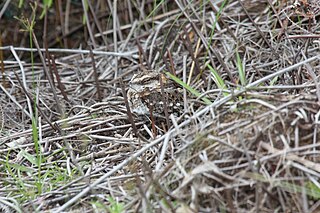
Herring are forage fish, mostly belonging to the family of Clupeidae.

Pera is a genus of plants in the family Peraceae native to tropical America, from southern Mexico and the West Indies south as far as Paraguay. It first described as a genus in 1784.

Craugastor pozo is a species of frog in the family Craugastoridae. It is endemic to Mexico and known from the western foothills and highlands of Chiapas. The specific name pozo refers to the local name of the area near its type locality, El Pozo. Common name Pozo Turipache rainfrog has been coined for it.

Lankanectes corrugatus is a species of frog in the family Nyctibatrachidae. It was once monotypic within the genus Lankanectes, until the second species - Lankanectes pera was described in 2018 from Knuckles Mountain Range. It is endemic to Sri Lanka.

The white-tailed nightjar is a species of nightjar in the family Caprimulgidae. It is found in the tropic regions of Central and South America.

The serows are four species of medium-sized goat-like or antelope-like mammals of the genus Capricornis. All four species of serow were until recently also classified under Naemorhedus, which now only contains the gorals.

Kandelia obovata is a species of plant in the Rhizophoraceae family, i.e. a kind of mangrove. It is found in Vietnam, Natuna Islands of Indonesia, Southern China, Hong Kong, Taiwan, and Japan. Its presence in the Philippines is possible but not confirmed.

Kandelia candel is a species of mangrove in the family Rhizophoraceae, found around the coasts of South Asia and Southeast Asia, from western India to Borneo. Populations further east, from Vietnam to Japan were formerly included in K. candel, but are now considered a separate species, K. obovata.

Neotricula aperta is a species of freshwater snail, an aquatic gastropod mollusk in the family Pomatiopsidae.
Schistosoma mekongi is a species of trematodes, also known as flukes. It is one of the five major schistosomes that account for all human infections, the other four being S. haematobium, S. mansoni, S. japonicum, and S. intercalatum. This trematode causes schistosomiasis in humans.

Sonneratia caseolaris, commonly known as mangrove apple, is a species of plant in the family Lythraceae. The fruit is noted for its outward similarity to the persimmon fruit.

Bruguiera parviflora is a tree in the family Rhizophoraceae. The specific epithet parviflora is from the Latin meaning "small flowers".

Rhizophora stylosa, the spotted mangrove, red mangrove, small stilted mangrove or stilt-root mangrove, is a tree in the family Rhizophoraceae. The specific epithet stylosa is from the Latin meaning "stylus form", referring to the flower.
Carex aperta, known as Columbian sedge, is a species of sedge that was first described by Francis Boott in 1839. It is native to eastern Russia, northern China, western Canada, and the northwestern United States. It grows in wet meadows, along shorelines, and in other wet habitats.

Lankanectes pera is a species of frog in the family Nyctibatrachidae. It is the second species found within the genus Lankanectes. It is endemic to Sri Lanka. Its common name is Corrugated Frogs.













